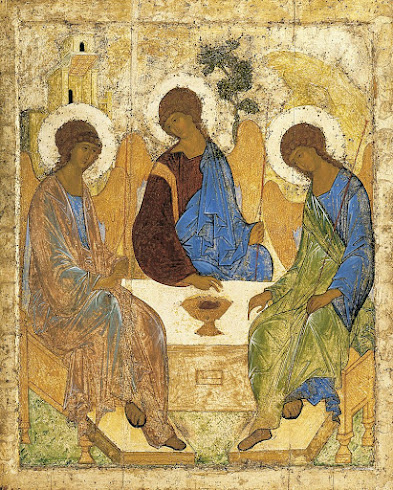Jesus answered the Jews:
"My Father is at work until now, so I am at work."
They correctly understood that Jesus was claiming for himself a unique prerogative. In calling "God his own father" his was not merely speaking metaphorically in the sense that God was the father of all of Israel. Such a metaphor did reveal God's love for Israel, but was always a stretch considering the distance between creature and creator. Jesus said God was his Father in such a way that it was clear to those who heard that he was "making himself equal to God". He could continue to give life on the Sabbath because he was the Son of a Father who did not cease to give life on the Sabbath. He had privileged access to the mind and the will of the Father that was basis for his own works in the world.
Amen, amen, I say to you, the Son cannot do anything on his own,
but only what he sees the Father doing;
for what he does, the Son will do also.
This wouldn't make sense at a merely metaphorically level. The people of Israel did not have such complete visibility into what the Father was doing, nor could they assume that they could do the same works done by him. But this is precisely what Jesus claimed.
For the Father loves the Son
and shows him everything that he himself does,
and he will show him greater works than these,
so that you may be amazed.
Because the Father is the ultimate source of life so too is the Son. But the Father honors the Son by giving him the role of being the source of life for us, and our hope of resurrection.
For just as the Father raises the dead and gives life,
so also does the Son give life to whomever he wishes.
The Father knows that there could never be a conflict between himself and Jesus and so he willingly makes Jesus the hinge of salvation for humanity. He gives life, resurrection, and judgment into the hands of his Son, to such an extent that it will be precisely by responding to the Son that we will not come to condemnation but inherit eternal life. By our response to Jesus we will be judged. But it is precisely in this response that the Father himself is honored.
Whoever does not honor the Son
does not honor the Father who sent him.
Amen, amen, I say to you, whoever hears my word
and believes in the one who sent me
has eternal life and will not come to condemnation,
but has passed from death to life.
By believing in the one sent by the Father we escape eternal condemnation but, not only that, have in a mysterious and spiritual way already "passed from death to life". It is we who can look forward in hope rather than terror to the coming hour "when the dead will hear the voice of the Son of God, and those who hear will live". This is another instance of the dichotomy of already/not yet that permeates the New Testament. We are already raised up and seated with Jesus in heavenly places. Yet we look forward to the last day, the general judgment, when our bodies and souls will be reunited to stand before the throne of God.
The fact that the Father so delights to give everything into the hands of his Son is not a sign that we who are not sons and daughters by nature are not loved. It isn't as though the Son's honor was a form of nepotism by which the Father preferred Jesus over creation. Rather, the love of the Triune God for us perfectly coincided with this honoring of the Son in the form of the incarnation. Thus the Father's pouring out all he has into the Son does not leave us impoverished but becomes our source of life and our hope. The incarnation has made it to be the case that however much the Father loves the Son, that love abounds and overflows to all who are found in him.
Since we become sons and daughters in the Son in baptism we do well to imitate the one who did not seek his own will but the will of him who sent him. When we learn to lay down our own prerogatives we will find the flood of divine life will flow through us, as it first did through Christ. Giving up our rights might seem a fearful prospect. It was in fact the surrendering of his rights that caused Jesus to embrace the cross for us. And in the same way we must embrace our own cross for others. Yet we can do so with great confidence in the Father's love for us, in trust that there is a context that makes our crosses make sense, and a resurrection awaiting on the far side of death.
Can a mother forget her infant,
be without tenderness for the child of her womb?
Even should she forget,
I will never forget you.

No comments:
Post a Comment